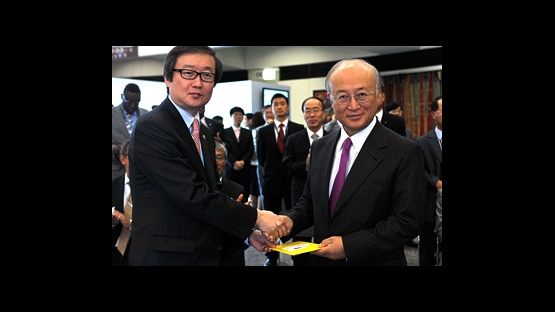Since its inception, the IAEA's Programme of Action for Cancer Therapy (PACT) has been devoted to forging partnerships with organizations and Member States working to fight cancer. Partnerships remain one of the cornerstones of the PACT programme and its support to Member States relies largely upon external financial resources. The majority of PACT's funding comes from development banks, Member States, partner organizations and the private sector.
"PACT has achieved great success through its fundraising efforts, mobilizing over US$30 million in funding, most of it directly at the country level," Massoud Samiei, Head of the PACT programme, explained.
"This funding supports a vast range of cancer control projects in Latin America and the Caribbean, Africa, Asia and Eastern Europe. PACT hopes to further expand the IAEA's efforts to improve the cancer control capacity of developing Member States and contribute to their efforts to relieve the suffering caused by the cancer epidemic," he added.
Tangible Results
A series of notable contributions were made to PACT as the IAEA held its 55th General Conference from 19 to 23 September 2011. The Republic of Korea showed its support for the global fight against cancer with a cash contribution of US$200 000. It was made by the Korea Institute of Radiological and Medical Sciences (KIRAMS) and was received after the KIRAMS and IAEA signed Practical Arrangements. Furthermore, the Korea Nuclear International Cooperation Foundation (KONICOF), donated US$20 000, marking the fifth consecutive year that KONICOF has supported the PACT initiative.
India likewise donated a radiotherapy machine to Namibia in 2011 - the third in a series of donations to developing nations - to support Namibia in fighting the cancer epidemic affecting its population. The Bhabhatron-II radiotherapy unit is due to be installed at the Oshakati State Hospital. (Read story).
"So far, we are happy that the process is working and in fact the one great advantage is that it is yielding tangible results in the countries," said Shri Dinkar Khullar, Ambassador of India to Austria, Permanent Representative of India to UN Offices and International Organizations in Vienna and Governor for India on the IAEA Board. "We would be happy to make further donations in cooperation with the IAEA as part of the PACT programme," he added.
During the PACT Briefing for Member States at the IAEA's 55th General Conference, the French National Cancer Institute (INCa), the Agency responsible for co-ordinating activities in the fight against cancer in France, concluded Practical Arrangements with the IAEA and announced plans to budget €100 000 to support the IAEA's cancer related activities, through PACT, in 2012.
A Similar Mission
The United Nations Federal Credit Union (UNFCU) has been a valued supporter of PACT for years, and has proven to be a strong proponent of PACT's mission to assist developing countries in fighting the cancer epidemic. In 2011, UNFCU once again demonstrated its support for PACT through a fourth donation of US$5 000, which will be put towards future PACT efforts to support women's cancer screening and therapy.
"UNFCU and IAEA PACT share a similar mission. UNFCU believes Corporate Social Responsibility is a key ingredient in helping improve the lives of disadvantaged people globally," Alan Potter, Chairman of the UNFCU Board of Directors noted.
Cancer incidence is on the rise in Nicaragua, including in children. To help the children in Nicaragua, the United Nations Womens Guild has pledged €7 000 to fund a project to remodel the waiting room in the "Centro Nacional de Radioterapia Nora Astorga (CNR)" in order to create space for children with cancer. Providing space for children to play will improve the recovery processes.
Spain has been one of PACT's most consistent donors, providing regular contributions to support PACT activities, as well as providing larger contributions to cancer projects facilitated by PACT in North Africa and Latin America. In 2011, Spain once again demonstrated its support by donating €20 000 for the overall implementation of PACT initiatives.
Also in 2011, the Principality of Monaco pledged to provide €100 000 through PACT to support Mongolia, the most recent PACT Model Demonstration site. With funding from Monaco, Mongolia hopes to improve its palliative care services for the benefit of cancer patients. The project is planned to be implemented over the course of 2012.
Background
Launched in 2004, PACT is an IAEA initiative in response to the developing world's growing cancer crisis, with the overall goal of raising cancer awareness, assessing needs and attracting donors.
In July 2009, the World Health Organization (WHO) and the IAEA launched a Joint Programme on Cancer Control, aimed at strengthening and accelerating efforts to fight cancer in the developing world. This ground breaking partnership between two United Nations organizations reflects growing international concern over the global cancer burden and its projected increase. The Joint Programme provides the framework for the two Organizations to dovetail their work, building on their areas of expertise to create a more coordinated and robust approach to combating cancer in low and middle income countries.



